Something Was Exaggerated On The Internet
“The reporter who was described as ‘trapped in a closet’ or ‘kidnapped’ by Vice President Joe Biden’s staff says the reports that reverberated across the Internet over the weekend dramatically exaggerated the details of his ‘imprisonment.’”
Richard Prince's Collected Testimonies
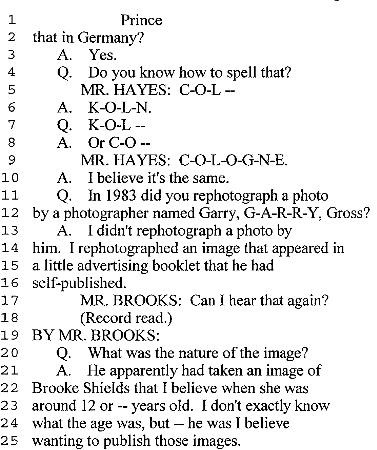
Canal Zone Richard Prince YES RASTA: Selected Court Documents, &c.;, &c.; is a new publication that consists of much of artist Richard Prince’s depositions in a court case brought by photographer Patrick Cariou against Prince and his dealers, Gagosian, for copyright infringement. Prince “borrowed” and “transformed” 41 of the artist’s photographs, though the judge believed that there was very little “transformation” whatsoever, and Prince lost the case. The ruling seems willfully obtuse about all manners of defining fair use, and a number of people are up in arms, though people who believe that any taking is theft are crowing. They should definitely go picket Andy Warhol’s grave.
Website Targets Hazy, Perhaps Jittery Demographic
Website Targets Hazy, Perhaps Jittery Demographic

Former Radar editor Maer Roshan — along with his partners, Allison Floam (who built Microdialogue, which does consumer analysis, and also sells SunSak, which is “a round towel that transforms into a tote bag”) and Joe Schrank (who runs a for-profit addiction recovery program) — have launched a website called The Fix, which covers the wild world of addiction in general and also has rehab reviews. In other new publication news, there is The Atavist, which (more slowly) publishes tablet and reader long-form nonfiction “singles” (that are not necessarily related to atavism).
Is There Anything Worse Than Being A Teen?
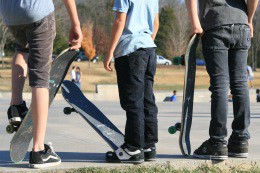
Science, why are teenagers so stupid?
Our brains have networks of neurons that weigh the costs and benefits of potential actions. Together these networks calculate how valuable things are and how far we’ll go to get them, making judgments in hundredths of a second, far from our conscious awareness. Recent research reveals that teen brains go awry because they weigh those consequences in peculiar ways…. The rush of hormones at puberty helps drive the reward-system network toward maturity, but those hormones do nothing to speed up the cognitive control network. Instead, cognitive control slowly matures through childhood, adolescence, and into early adulthood. Until it catches up, teenagers are stuck with strong responses to rewards without much of a compensating response to the associated risks.
Um, this sounds exactly right. God, do you remember how awful it was being a teenager? You could not PAY ME ENOUGH to go back. Especially these days, with teens now being vulnerable to “Facebook depression,” an affliction “more painful than sitting alone in a crowded school cafeteria or other real-life encounters that can make kids feel down.” The next time you are tempted to feel sorry for yourself — and, sure, there is plenty to feel sorry about — just remember that at least you are not a teenager. (If you are a teenager all I can tell you is that if you manage to get through it the rewards are more than ample. At least for about ten years or so. After that it all starts falling to shit again, plus you’ve built up a deep well of regrets, and also you’re carrying around some extra weight and you don’t move as quickly as you used to and everything hurts all the time and some days you feel like you’re never going to stop crying. But you’re legal to drink, so it’s kind of a draw. Anyway, teenager, it’ll be okay, I promise. Do not let them scare you with the “Facebook depression” or “Twitter terror” or whatever else they try to turn the basic angst of being human into some kind of diagnosable condition. Just keep it together and all the suffering you’re doing now will be repaid handsomely. For a while. Also, keep reading this website, you’re really helping our aggregate demographics.) Things may seem hopeless (I am talking to the old people again now), but at the very least you can go to a bar, get drunk, pick someone up and take them home and do sex to them and however briefly alleviate the pain of existence. Plus, you no longer have to take Morrissey lyrics seriously. So, really, it could be much worse.
The Week We Ran The Stories That We Have Listed Below

• Japan Nuclear Crisis: The Experts Weigh In
• How You Can Make The Most Delicious Sandwich In New York City
• Against Our War in Libya
• My Life Without A Cell Phone: An Amazing Tale Of Survival
• Here’s Why You Need These Seven Odd Kitchen Ingredients
• 41 Movie Remakes That Would Destroy What Remains Of My Youth, In Order Of Heartbreak
• 21 Blasters, Ranked In Order Of Apparent Usefulness
• Am I The Only One Troubled By The Growing Omnipotence Of State Farm Insurance People?
• Random New Yorker: Barry Harwood, Curator of Decorative Arts, The Brooklyn Museum
• Elizabeth Taylor and AIDS: A Brief History of the 80s
Photo by Twig_is_the_Future, from Flickr.
Dear Jon Pack
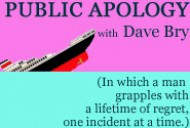
Dear Jon Pack,
Sorry for using you as a moving target.
It happened pretty regularly for a while there that summer, 1981 or 1982, I’d think — when you were eight and I was ten, or you were nine and I was eleven. It was a game we invented, your older brother Chris and I.
We played in my backyard, which was just a couple backyards away from your backyard, with a Frisbee (thank god, as opposed to say, a baseball, or rocks, or lawn darts.) It was like monkey in the middle. Except that rather than try to catch the Frisbee, the person in the middle tried to dodge it, or at the very least block it, because the other two people were throwing it as hard as they could, aiming for the head. There was no way for the person in the middle to ever get out of the middle, either. And you were always the person in the middle. Because Chis and I were cruel.
Of course, for boys our age, cruelty was the natural order of things. Older kids in the neighborhood were certainly cruel to us. I can still taste the handfuls of grass that Karl Torchia used to make me eat, still feel his knees pinning my shoulders to the ground. I can still hear Ryan Mingo’s voice telling me I looked like a “queer bait” one Halloween around that time (he and Michael Peterson were trick-or-treating in normal clothes, having outgrown costumes) and the sudden embarrassment I felt about the toupees I’d glued to the top of my bedroom slippers, so as make for a more realistic Hobbit. How proud I’d been of the idea up to that moment.
Shit runs downhill, as they say. Being Chris’s little brother, all you wanted in the world was to hang out with him. And being your older brother, only a very small part of what Chris wanted in the world was to hang out with you. Chris and I were best friends, and we spent a lot of time telling you to buzz off. You were persistent, though, and had the backing of your mom, who of course wanted us to let you hang around. So we established these conditions — you being a moving target — as the only ones under which we allowed you to play with us.
You went along willingly for the most part, just happy to be included. But the Frisbee we used was one those big, heavy-test ones — a black Wham-o World Class model, I remember, with the globe print in the center, 175 grams, I think. Maybe 200. It hurt when it hit, which made the game more interesting. You had a strong incentive to try hard. And you were good, too! I remember some impressive jukes and leaps and dives. But you could only dodge for so long. Eventually, you’d tire, and we’d hit you and you’d fall down in a heap and cry. And we’d celebrate. And then sometimes one of us would get the Frisbee from where it had landed after bouncing off of you and throw it at you and hit you again while you were lying there. There’s a reason younger siblings are usually tougher people, probably better people in lots of ways, than their older brothers and sisters.
I hope you look back at the Frisbee human target game we used to play and smile rather than shudder. I hope it’s not a source of any lingering pain. If it is, again, sorry. But I doubt it’s anything too heavy. Karl Torchia just Facebook friended me a couple days ago. I don’t think I’ve spoken to him in, God, 25 years. It was nice to see his picture. He has some cute kids.
Awards, TV and Press Do Nothing: Indie Music, Away from the SxSW Hordes
by Brett Sokol
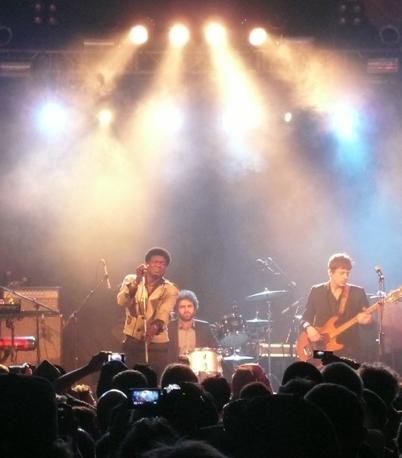
The panel discussion was defiantly titled “Flying The Indie Flag” and the mood was clearly intended to be triumphant. “Indie labels are having a banner year,” crowed the panel’s organizers at last week’s South by Southwest music festival in Austin, Texas, and are “being successful by doing it their way, in a world where major labels no longer control the music business landscape.” Yet the faces on the actual indie label panelists looked anything but victorious.
Sub Pop Records co-founder Jonathan Poneman — still earning sizable royalties for his initial signing of Nirvana over two decades ago — scowled his way through a series of accolades delivered for him. And Mac McCaughan, frontman for indie rock standard-bearers Superchunk and co-founder of Merge Records, merely shrugged and then shrank back in his seat as moderator Karen Glauber, president of Hits magazine, began gushing over the recent accomplishments of Merge’s Arcade Fire: A gold record — 500,000 CD sales — at a time when such certifications are increasingly rare for even the industry’s biggest players, followed by a left-field Grammy award.
Glauber recalled screaming in delight when the win was announced, leaping out of her seat in the Grammy audience. Meanwhile, she said, and laughed, “Everybody around me was asking each other ‘Who is Arcade Fire?’” Indeed, hip-hop record executive turned advertising mogul Steve Stoute even bought a $40,000 full-page ad in the New York Times to run his protest letter to that effect. (That he chose to buy a page in Sunday Styles — as opposed to Business or the front news section — carries its own modern media lesson.)
So, Glauber bubbled, was McCaughan riding that wave? Was he doing anything different with Merge’s marketing plans in the wake of the Grammys? McCaughan shrugged again. The recognition was nice, he explained, “but it doesn’t change what you’re doing.” Yes, he’d been able to book Merge act Telekinesis onto “Late Night with Jimmy Fallon.” And network TV exposure is always appreciated. But he’d already had several of his label’s artists perform on Fallon’s TV show over the past year. “It doesn’t help us sell any more records.” The traditional gatekeepers may have abandoned their posts, but so have the audiences they once commanded.
Gerard Cosloy, co-owner of Matador Records, chimed in: Two decades ago, having a Matador release from Pavement or Yo La Tengo top the Village Voice’s annual Pazz & Jopp poll, or appear in a New York Times review, would result in a sales bump of up to forty percent. The sales boost from such placements today? Zilch. Cosloy was hoping the industry would consider scaling down their award system: Forget about platinum and gold. How about wood?
Still, if the bottom continues to drop out of the music business, that was news to the crowds that converged on Austin for SXSW’s twenty-fifth edition. Police estimated the throng at 200,000 (in a city of 790,000), though only 14,000 were actually registered to attend SXSW’s official music events. That’s a fairly good metaphor for the state of the industry-at-large, particularly as many attendees took to the web to subsequently decry the fest’s “commercialization,” conveniently forgetting that SXSW was launched as an insider’s trade show, a way to entice A&R; men and critics into seeing bands far from the NY and LA club axis — not as a fan-focused free-for-all.
For a party sans even a whiff of angst, all you had to do was latch onto some of SXSW’s Interactive attendees (at 19,000, they eclipsed the music portion of the fest). Many opted to hang around Austin after their own festival wrapped, spring break-style, flexing their expense accounts in a manner that could only make music bizzers nostalgic for their own salad days. Or at least conjure up flashbacks to the first dot-com boom. “Startups were loaded down with venture capital that they had to spend to qualify for their next round of funding,” remembered SXSW executive director Mike Shea, in the newly published SXSW Scrapbook. “We had companies calling to tell us how much money they needed to spend and wondering what they could buy for that. Good times.”
The good times were certainly back on the swag front. In years past, SXSW music attendees were handed a “big bag” bulging with all manner of sponsor-provided tchotkes. This year’s bag was virtually empty beyond a thick festival schedule, part of SXSW’s stated desire to “reduce its environmental impact.” This somehow didn’t stop organizers from stuffing scads of fliers and corporate toys into the Interactive fest’s bag. Likewise, the music festival’s Convention Center trade show featured only a handful of booths bought by music-related companies. The bulk were instead manned by online entities, from WordPress to the digital temp agency Solvate (whose “Boba Fett was a freelancer” T-shirts were a big hit).
Which isn’t to say there weren’t still dozens of good reasons to wander around Austin. If you looked past the usual blog suspects and next-big-things all busy recreating the stifling New York-Los Angeles axis of yore, incredible musicians were still pouring their hearts out, analog-style, at makeshift venues all over town. The quality level was generally inverse to the number of bloggers on hand.
In a back lot behind the nondescript G&S; Lounge, local roots music magazine 3rd Coast Music (“You’re not getting old, the music really does suck”) assembled its own five-day bill of country-tinged “Not SXSW” acts, including Austin singer-songwriter Sam Baker. With mandolin, acoustic guitar and violin accompaniment, Baker spun out a spellbinding set that invoked prime-era John Prine, by turns heartbreaking and wryly moving. And amidst the 200 or so folks raptly watching, only one felt compelled to whip out his iPhone to immortalize the moment.
Similarly, honky tonk-roadhouse veteran Dale Watson kept a bowling alley-cum-nightclub full of people too busy dancing to worry about shooting video of his set of infectiously dirtied-up swing tunes. Just as seasoned, but releasing his debut album at the age of 61, was rhythm and blues crooner Charles Bradley. Backed by much of the same crew of old-school soul musicians who helped reinvent Amy Winehouse (and currently perform with singer Sharon Jones), Bradley wildly shimmied his way across a cramped outdoor stage, riffing off the James Brown impersonation act which first got him noticed, and nearly knocking over both his guitarist and his horn section in the process. From the female screams that emanated out of the front row, the crotch-eye view of Bradley’s contortions was even more entertaining than my own overhead vantage point.
After all that, should one still be jonesing for a flock of unwashed bohos to kick up a fuzz-laden racket, complete with vintage organs and rows of effects pedals, Austin’s own Black Angels more than delivered, thanks in no small part to its head-snapping drummer.
Unfortunately, that full-body rumble doesn’t quite translate onto the group’s latest CD Phosphene Dream — a solid outing, yet hardly as memorable as hearing those same songs tackled live. Which is increasingly all that matters, fiscally speaking. With concert ticket sales the only consistent income for most indie and major label acts alike, CDs are becoming promotional items, calling cards for the main event.
If there’s a sticking point in this New Economy, it’s that rock swagger in the digital age ain’t what it used to be. Prior to their show, Black Angels guitarist Christian Bland threaded his way through the crush to knock on a backstage door. He was met by a gruff security guard who sized up the smiling beanpole before him and barked back, “This room is for the band only.” Bland seemed at a loss. Then, regaining his composure, he insisted, “But I am in the band!”
Brett Sokol’s writing has appeared in The New York Times, The New York Observer, New York, Slate, and Miami Beach’s Ocean Drive magazine, where he is the arts editor. He still owns a fax machine, two landline phones and a VCR.
Photo of Charles Bradley at SxSW by Jim Porter.
Three Great Songs From The Arab Revolutions' Soundtrack
Three Great Songs From The Arab Revolutions’ Soundtrack
by Nick Kimbrell
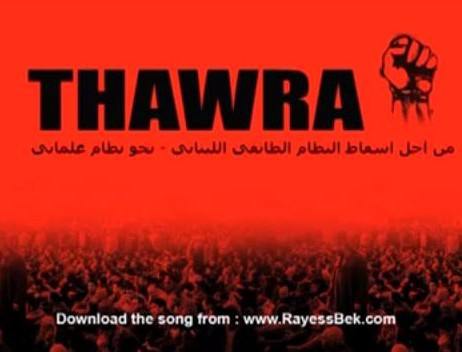
The revolutions in the Arab world have been texted, tweeted, and Facebooked. They’ve been written and televised. They also have a soundtrack. Ever since the Tunisian street vendor Mohamed Bouazizi set himself on fire as a protest in Sidi Bouzid last December, uprisings have spread across the region and they’ve been accompanied by music.
Many of the most inspiring songs are far from new. The Egyptian national anthem, “Biladi, Biladi, Biladi,” composed by Sayed Darwish after the First World War — another revolutionary period in Egypt’s history — has taken on an entirely new meaning. As have the Tunisian national anthem, “Humat al-Hima” (penned in part by Abdul-Qasim Al Shabi, whose poem “To the tyrants of the world” was recited at protests) and the nationalistic ballads of Egyptian icon and enchantress Oum Kalthoum. But a number of new songs have emerged during the uprisings, often written by those participating. Some are touching, some are tinged with menace, others are undeniably hilarious. Here’s a sampling.
With his attractive lady bodyguards and massive traveling tents, Muammar Gaddafi has long been the easily satirized bête noire of Western politicians. But as protests and rebellion spread across Libya in February, Gaddafi’s rhetoric turned murderous. In a February 22 speech, the man who has ruled Libya for the last four decades threatened a frightening campaign of national cleansing — “shebr shebr, beit beit, dar dar, zenga zenga” (“inch by inch, house by house, home by home, alleyway by alleyway”). Israeli DJ Noy Alooshe saw the phrase as a unique opportunity for a club hit. Although Gaddafi would act on his brutal promise, the song undercuts the tyrant in its own way. (A clean version is available for those distracted by the dancer.)
If you find yourself in one of Lebanon’s increasingly popular anti-sectarian marches, as rice falls from the balconies Rayess Bek’s new track “Thawra” will be blaring from the street speakers. Rayess Bek is the undisputed don of Lebanese hip-hop. He made “Thawra” (‘Revolution”) for the Lebanese protesters, creating much of it from their actual chants. The song is punctuated by the word “Thawra,” but also by the now famous chant that has spread across the region: “As-shaab yureed isqaat an-nizam” (“the people want the fall of the regime”).
Egypt’s revolution is the hallmark of the “Arab Spring.” For weeks protesters braved violence and a long-feared security apparatus to bring an end to Hosni Mubarak’s 30-year presidency. While folk songs and patriotic hymns dominated the demonstrations, Egyptian musicians Amir Eid and Hany Adel’s compelling gentle rock song “Sout al-Horeya” (“Voice of Freedom”) proved very popular. The ballad pairs shots of the Tahrir protests with videos of protesters singing the lyrics and voiceovers. More than a million people have listened to the song on Youtube. Above is the version with English subtitles.
This, of course, is just a sampling of the variety of songs born from the string of 2011 Arab revolutions. But the uprisings are far from over. Whether more protests anthems spring up — perhaps from Yemen, Bahrain, or Syria — remains to be seen.
Nick Kimbrell is a journalist and screenwriter. He lives in New York but spends a fair amount of time elsewhere. He’s worked as a reporter for Beirut’s Daily Star and a correspondent for The National. Look out for the film he wrote — when it has a new name he’ll share it.
Awl Pals All Up In New York Times Magazine
In this weekend’s New York Times Magazine, Awl pal Jay Caspian Kang profiles a 21-year-old online poker millionaire. Also in this weekend’s New York Time Magazine, Awl pal Heather Havrilesky reflects: “Conversations between middle-aged people and teenagers tend to be a little awkward, probably because we have so much in common.” What we’re saying is you should read this week’s New York Times Magazine. They’ve got some good writers in there.
'Mildred Pierce': Set Your DVRs on 'OMG What?'

The five-part, Todd Haynes-directed miniseries of “Mildred Pierce” starts on Sunday, at 9 p.m., on HBO. Let me just tell you the most important part right now: The first episode may not particularly make you want to carry on! You might hate it immediately. But you likely should press on: what follows is definitely more exciting and pleasurable, as the show goes on. And sometimes when you try a weird new flavor, it’s disgusting at first. This flavor is decidedly off-putting or maybe just like it popped out of a time machine from when flavors were different: it’s the starchy tale of a snooty lady, and from the hilariously sombre/boring/gorgeous opening credits to the extremely odd, maybe terrific, maybe not Kate Winslet performance, you may feel quite uncomfortable. Many of you will decide that this is not your cup of period-simulacra tea, and that’s fine. But try it, because some of you will have your heads blown off.
So Mildred Pierce, the original text, is sort of like Raymond Chandler writing Edith Wharton? So it makes sense (and spoils nothing) to say that our heroine sobs and vomits at the prospect of becoming a waitress. The high drama of downward mobility! Which today registers a confusing note. Like, it’s a recession, go sling some hash, sister!
And, I mean, we’re talking about the 1930s, not the 1890s here, you know, though I guess it’s good to remember that there are only 40 years between the eras of Lily Bart and Mildred Pierce. That’s like the 1970s to the 2010s, which, I know that sounds really, really dumb to say, but it’s important to remember that history is so compact, and ideas about class and manners and position and sex (and sex positions! Hi-o!) change quite rapidly.
Reasons to press on include: Hope Davis and Guy Pearce. Hoo boy, Emmys ahoy. Hope Davis is just the greatest thing always, and Guy Pearce looks incredible naked. And the hair on everyone is magnificent. The locations and clothes are incredible, and this must have cost a fortune.
And it feels big. And that’s the issue with Her Oscar-Havingness, The Lady Kate Twinset. This is either a marvel of acting or it’s… not. I really couldn’t tell you. What do I know? Let’s have the professionals decide and just praise her commitment. She’s definitely… forceful: stomping around, looking put-upon, putting on her size-ten waitress uniform, her mouth constantly turned down. Maybe what’s hard to watch is to have this weird black hole of a character at the center of the story — and she is on-screen constantly. So Winslet is seriously overclocking here. I bet when she went home for the day, steam was coming out of her ears. What’s to say! I’ve never really “gotten” her, but I do admire her, and, you know, Heavenly Creatures, we owe her a debt for life.
Have I made this all sound terribly unappealing? It isn’t. It’s complicated! It’s fascinating! It’s something you haven’t seen before. And it’s definitely melodrama. But it’s honest melodrama, if that’s a possible thing.
